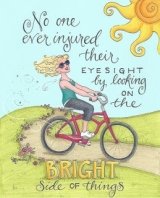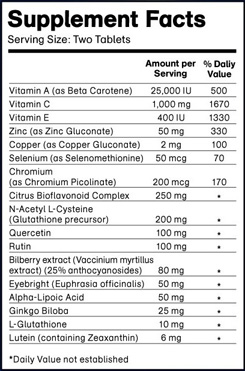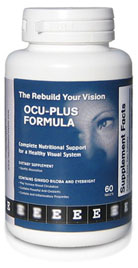|
What we feed our bodies feeds our eyes.
Many of the vitamins and minerals in our bodies are found in much higher concentrations in our eyes, so a diet lacking in these vitamins and minerals can lead to vision problems as we grow older. Take the time every day to give your eyes (and the rest of your body) the nutritive support they need. Eat the foods and take the supplements that provide the antioxidant vitamins and minerals your eyes require. You’ll Protect Your Eyesight, ensuring years of good eye health, and increasing the odds that you’ll avoid blindness or vision loss for the rest of your life. If you find this newsletter useful, please do a friend and us a big favor and "pay it forward." Forward this issue to all your friends. If a friend passed this issue along to you, and you like what you read, please subscribe by visiting... Protect Your Eyesight Do You Have a Vision Story That You Can Share? I need your help. I have a page on this website that is for my readers to tell their Eyesight story. My hope was to have people tell their story so it might help someone else with the same problem or experience. But lately there has not been any activity on this page. Could you please look at this page and contribute someone if you can. Thank You Do You Have a Story That Could help Someone Else? Click Here
Table of ContentsApril – Vitamin D for Age Related Macular Degeneration A study that came out in April 2011 showed nearly beyond a doubt that Vitamin D can be one of the most effective preventative measures for age related Macular Degeneration, a condition that causes your eyesight to deteriorate as you get older. This is huge news and shows everyone that a little preventative care can do a whole lot to Protect Your Eyesight, as you get older. In case you haven't heard about the research, I want to take this opportunity to summarize some of the findings and then list some of the best dietary sources of Vitamin D that you can eat on a daily basis. First of all, the study really looked at women as opposed to men, but the findings are universal. It showed that women who supplemented with more Vitamin D were more than 50% less likely to develop early onset age related Macular Degeneration. It looked at women who were between 40 and 75 years of age. Since then, there have been other findings that proved the same thing – Vitamin D plays a huge role in the regeneration of your macular tissue. They used 1300 women in that age group and tested their blood concentrations of Vitamin D, and then compared the results to the level of Macular Degeneration that they were experiencing, and the results were the same in nearly every case. Macular degeneration is characterized by a slow, progressive Loss of Vision. Parts of your eyesight may start to have Blurry Vision, or you might start to notice some wavy lines or dark spots. It happens to nearly every human being as a result of the aging process. As we get older, our cells become less efficient at rebuilding. It's the same reason we get wrinkles with age. These studies are immensely useful for everyone (unless, of course, you don't age!). Most people start to see real degeneration in their mid 50's or early 60's, but early onset macular degeneration can hit people as young as 40 years old. The moral of the story is take your Vitamin D! 75 may be a long way off for some of you, but there's no reason that you can't start protecting your eyesight now. Go see a doctor to get your blood levels of Vitamin D checked. Ask specifically for a test to measure 25-hydroxyvitamin D, also known as 25(OH)D. Here are a few highly concentrated sources of Vitamin D that you can add to your diet: Leafy Vegetables for Eye Health are high in Vitamin D. These include lettuce, spinach, kale, and cabbage. Grains and cereals are known to have high levels naturally, and oatmeal has some of the highest concentrations. Fish is great, and also a quality source of Omega-3's which have further protective benefits. Milk and eggs are another popular choice for Vitamin D. Remember nothing beats a healthy diet with the right balance of Vitamins and Minerals when it comes to preventing an Eyesight Problem. Your eyes will thank you!

Comments? Ideas? Feedback? We want to hear from you with your complaints, compliments or suggestions. That's the only way we can make EyeSight Vision Care! more useful for you. Have something to tell us? Click on Reply in the menu and tell us what you think! |
More Information
Vision Training for GOLF...
"Everything you wanted to know about how your eyesight affects your game, with self tests and tips to aid alignment, reading greens and judging speed and distance. Much more fascinating than it sounds."- Golf Magazine - Click Here!



